|
|
|
Sort Order |
|
|
|
Items / Page
|
|
|
|
|
|
|
| Srl | Item |
| 1 |
ID:
190052
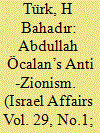

|
|
|
|
|
| Summary/Abstract |
Anti-Zionism has been a salient component of rightwing and leftwing movements in Turkey. The Kurdistan Workers’ Party (Partiya Karkerên Kurdistan, PKK) that took its cue from the Turkish Left has become a topic of discussion since its founding in 1978. Yet little effort has been devoted to analysing the political thought of the PKK’s leader, Abdullah Öcalan. Using an interpretative-textual method, this article seeks to fill this lacuna by discussing the role of anti-Zionism in Öcalan’s thought.
|
|
|
|
|
|
|
|
|
|
|
|
|
|
|
|
| 2 |
ID:
190047
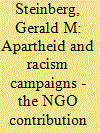

|
|
|
|
|
| Summary/Abstract |
Under the headings of promoting human rights and international law, the influential network of non-governmental organisations (NGOs) has been a central actor in the political war targeting Israel though allegations of apartheid and racism. In applying these slanders, the NGOs systematically erase the history of the Arab-Israeli conflict, including decades of warfare and terrorism, and join in the attempt to delegitimize the nation-state of the Jewish people, regardless of borders, and as distinct from criticism of Israeli policies regarding territory occupied in the 1967 war. This process constitutes the essence of post-Holocaust or ‘new antisemitism’, as included in the consensus working definition published by the International Holocaust Remembrance Alliance. The NGO campaigns are constructed on the foundations established by the Soviet and Islamic blocs culminating in the 1975 UN ‘Zionism is racism’ resolution. This theme was revived in the NGO Forum of the 2001 Durban Conference, led by Human Rights Watch, Amnesty International, and Palestinian groups such as Al-Haq, and used to justify appropriating the methods of the South African anti-apartheid campaign, including boycotts and lawfare. After the Durban conference and for 20 years since, this NGO network continued and expanded the campaign based on the apartheid and racism allegations. Their claims were amplified in media platforms, international bodies, anti-Israel church groups and on university campuses in the form of ‘Israel apartheid weeks’. European governments enabled activities of the Palestinian and Israeli NGOs through substantial funding, estimated at 120 million Euros annually. In 2020 and 2021, the NGO emphasis on these themes increased, led by HRW, and supporting the decision of the ICC prosecutor to accept jurisdiction over Palestinian claims and to open investigations against Israel. This context amplified the potency of the allegations of apartheid and racism in attempts to demonise Israel.
|
|
|
|
|
|
|
|
|
|
|
|
|
|
|
|
| 3 |
ID:
100688
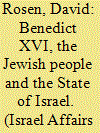

|
|
|
|
|
| Publication |
2010.
|
| Summary/Abstract |
Benedict XVI has had to contend with invidious comparisons to his predecessor from the outset of his pontificate and this has been reflected in Jewish attitudes towards him as well. At the same time a selective loss of memory has occurred in relation to Pope John Paul II. By examining the documents and initiatives of Cardinal Ratzinger, as well as Pope Benedict XVI, this article shows that the idea that Benedict XVI is lacking commitment to the Catholic-Jewish relationship could not be further from the truth.
|
|
|
|
|
|
|
|
|
|
|
|
|
|
|
|
| 4 |
ID:
190054
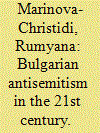

|
|
|
|
|
| Summary/Abstract |
This article examines the conceptual elements of antisemitism in Bulgaria today as well as the ways in which these concepts are communicated linguistically and visually. It seeks to provide an insight into different aspects of antisemitism – from direct manifestations to attempts at rewriting or distorting the history of Bulgaria’s Jewry. The IHRA definition is used for the identification of antisemitic manifestations, from classical stereotypes (power, greed, etc.) to more contemporary attributions (Israel-related antisemitism such as instrumentalisation of the Holocaust, Nazi analogy, denial of Israel’s right to exist).
|
|
|
|
|
|
|
|
|
|
|
|
|
|
|
|
| 5 |
ID:
058832
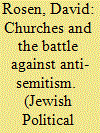

|
|
|
| 6 |
ID:
177574
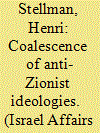

|
|
|
|
|
| Summary/Abstract |
This article examines the coalescence of the main anti-Zionist ideologies: Left, Jewish, Christian, Arab/Muslim and Conspiracy anti-Zionism. After a definition of anti-Zionism, its relationship to antisemitism and an overview of the historical origin of the coalescence drive, the article shows the extent of the synergy between representatives of the main anti-Zionist ideologies. It concludes that the accusation of a global conspiracy ascribed by antisemites to Zionism and Judaism can be turned on its head: it is in fact a feature of anti-Zionist ideologies that are otherwise in existential struggle with each other.
|
|
|
|
|
|
|
|
|
|
|
|
|
|
|
|
| 7 |
ID:
058837
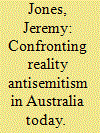

|
|
|
| 8 |
ID:
177575
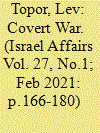

|
|
|
|
|
| Summary/Abstract |
The Boycott, Divestment and Sanctions (BDS) movement, a Palestinian-led anti-Israel international campaign, seems necessary to many ‘progressive’ activists, especially from the radical left. However, it promotes antisemitism through boycotting; legitimisation of terrorism through whitewashing; the destruction of Israel via support for the Palestinian ‘right of return’; and acceptance of antisemitic anti-Zionism by associating Jews, all Jews, with Israel.
|
|
|
|
|
|
|
|
|
|
|
|
|
|
|
|
| 9 |
ID:
037160
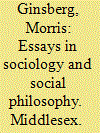

|
|
|
|
|
| Publication |
Middlesex, Penguin Books, 1968.
|
| Description |
384p.
|
|
|
|
|
|
|
|
|
|
|
|
Copies: C:1/I:0,R:0,Q:0
Circulation
| Accession# | Call# | Current Location | Status | Policy | Location |
| 001074 | 301/GIN 001074 | Main | On Shelf | General | |
|
|
|
|
| 10 |
ID:
123130
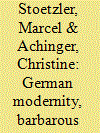

|
|
|
|
|
| Publication |
2013.
|
| Summary/Abstract |
This paper examines emblematic texts by two important protagonists of post-1848 liberalism in Germany, Gustav Freytag and Heinrich von Treitschke, focusing on their treatment of Jews and Poles. The paper analyses the social content of their statements and argues that the elements of anti-Semitism and anti-Slav racism that they contain were motivated by the specific kind of nationalist liberalism that frames their affirmation of the process of modernisation. This affirmation was directed against the Poles on the one hand, seen as backward Easterners who had to be pushed into civilisation by Prussian-German colonialism, and, on the other hand, the Jews, largely perceived as representing the wrong kind of modernity against which benign (supposedly German) modernity had to be protected. At the same time, the image of the Jew in Freytag and Treitschke also participates in that of the backward Easterner, permitting to see undesirable, allegedly Jewish aspects of modernity also as distortions resulting from an alien and ancient culture. This analysis has consequences for theorisations of both liberalism and nationalism: it suggests that the racism and anti-Semitism of nationalist liberals were intrinsically related to core aspects of the liberal world-view rather than being merely contingent opinions held by particular individuals. It also indicates that the nationalism of many German post-1848 liberals was ethnic as well as liberal. In this way, the paper contributes to the growing body of literature discussing the illiberal aspects of liberalism as well as the shortcomings of the long-established conceptual dichotomy of ethnic vs. liberal nationalism.
|
|
|
|
|
|
|
|
|
|
|
|
|
|
|
|
| 11 |
ID:
050654
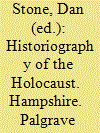

|
|
|
|
|
| Publication |
Hampshire, Palgrave Macmillan, 2004.
|
| Description |
xi, 573p.Hbk
|
| Series |
Historiography of the Holocaust
|
| Standard Number |
033399745X
|
|
|
|
|
|
|
|
|
|
|
|
Copies: C:1/I:0,R:0,Q:0
Circulation
| Accession# | Call# | Current Location | Status | Policy | Location |
| 047793 | 940.5318072/STO 047793 | Main | On Shelf | General | |
|
|
|
|
| 12 |
ID:
176082
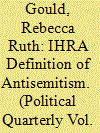

|
|
|
|
|
| Summary/Abstract |
The IHRA definition is one of the most contentious documents in the history of efforts to combat antisemitism. Although it first became well known in the UK as a result of disputes within the Labour Party, the definition reaches well beyond that context, and has been adopted by universities, city councils, and governments. With its intensive focus on the critique of Israel as a marker of antisemitism, the IHRA definition has been heavily implicated in the suppression of Israel‐critical speech in recent years. This article is among the first to adopt a global perspective on the definition—both its history and its content—clarifying the political stakes of this definition and broader paratextual apparatus for a general audience, and provides an explanation of why it should be rejected rather than used to censor Israel‐critical speech.
|
|
|
|
|
|
|
|
|
|
|
|
|
|
|
|
| 13 |
ID:
058836
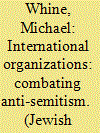

|
|
|
| 14 |
ID:
190051
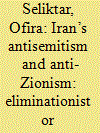

|
|
|
|
|
| Summary/Abstract |
The discussion of Iran’s antisemitism and anti-Zionism has been separated from the debate on the Islamist regime’s nuclear project. A synthesis of the issues is needed given that both are the core of the regime’s foreign policy. Some observers consider the regime’s antisemitism and anti-Zionism – promising Israel’s destruction – to be eliminationist. Most others, however, argue that the rhetoric is performative, designed to bolster the Shiite theocracy in a predominantly Sunni region. While the debate cannot be settled, it is well known that nuclear warfare does not allow for a margin of error in predictions. Should the advocates of performative anti-Zionism be wrong, millions of Jews and others would die.
|
|
|
|
|
|
|
|
|
|
|
|
|
|
|
|
| 15 |
ID:
191891
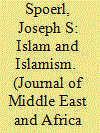

|
|
|
|
|
| Summary/Abstract |
In his 2012 book Islamism and Islam, Bassam Tibi argues that Islamism, a political ideology, is quite distinct from Islam, which he defines as a religion focused on faith and spirituality. This article analyzes and evaluates the six arguments that Tibi advances for this thesis and finds all of them unconvincing. The main problem with Tibi’s case is that it ignores the figure of Muḥammad, whom Islamic sources uniformly portray as someone who fused politics and religion and sought to overthrow a non-Islamic socio-religious order and to replace it with an Islamic one. For mainstream Muslims, Muḥammad is the perfect role model who possessed divinely granted infallibility against sin and error. Due to Muḥammad’s example, as enshrined in classical Islamic sources, Islamists have a strong claim to be following orthodox Islamic principles when they embrace an ideology in which religion and politics are tightly intertwined. The article concludes with some tentative suggestions as to how a Muslim reformer like Tibi might develop more promising arguments for a progressive form of Islam.
|
|
|
|
|
|
|
|
|
|
|
|
|
|
|
|
| 16 |
ID:
177569
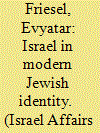

|
|
|
|
|
| Summary/Abstract |
Contemporary Jewry is burdened by a fierce debate about Zionism and Israel. A sizeable sector of Jewish academics, where leftists and self-declared liberals are strongly represented, criticises the Jewish state to the point of casting doubts regarding its very existence. Although their argumentation is frequently similar to the utterances of non-Jewish antisemites, what moves these Jewish Israel-critics is not so much Jews and Judaism but rather the Zionist idea. Such anti-Israel Jews are influenced by modern ideological trends and pressures that affect also, strangely enough, certain Israeli Jewish intellectuals. These developments happen on the background of an increasing pattern of Jew-hatred in non-Jewish society, a transformation of past antisemitism now expressed as anti-Israelism.
|
|
|
|
|
|
|
|
|
|
|
|
|
|
|
|
| 17 |
ID:
190049
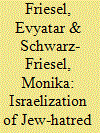

|
|
|
|
|
| Summary/Abstract |
A new wave of antisemitism has lately emerged, mostly directed against the Jewish state of Israel. It justifies itself with a new formulation that obfuscates Jew-hatred and its main bearers are Western left-oriented academics. A worrying fact is the large number of Jewish intellectuals, among them Israelis, who support such positions. This reflects the deepening ideological differences in present-day Jewry with regard to the Jewish state and its characteristics, an issue that is insufficiently addressed.
|
|
|
|
|
|
|
|
|
|
|
|
|
|
|
|
| 18 |
ID:
189414
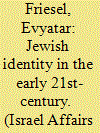

|
|
|
|
|
| Summary/Abstract |
The social and cultural integration of the Jews into Western society was a central paradigm of modern Jewry. Presently, ideological changes in sectors of ‘progressive’ Western society regarding the Jewish state and the Jews, as well as political and cultural tendencies in Israel, are unsettling the parameters of that paradigm, bringing up new tensions between non-Jews and Jews and changing Jewish profiles. Such multifaceted developments should be understood in the framework of the broader tendencies in Jewish history.
|
|
|
|
|
|
|
|
|
|
|
|
|
|
|
|
| 19 |
ID:
190045
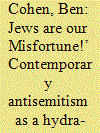

|
|
|
|
|
| Summary/Abstract |
Antisemitism has once again proven itself to be an international phenomenon, crossing borders and cultures with ease and adept at finding major issues in the public square, such as the COVID-19 pandemic, upon which to hang its claims. This article argues that antisemitism currently takes four major forms: Anti-Zionist antisemitism, which targets the State of Israel as a Jewish collectivity; Neo-Traditionalism, which revives pre-modern anti-Judaic notions in contemporary guise; Holocaust relativisation, which involves instrumentalizing and distorting the nature of the Holocaust without denying it outright; and anti-Judaism, which manifests in efforts to ban circumcision, kosher slaughter and other core Jewish rituals. The article concludes by examining whether the International Holocaust Remembrance Alliance (IHRA) Working Definition of Antisemitism is an adequate tool for engaging with a growing problem, suggesting ways in which the definition might be amended to make it more effective.
|
|
|
|
|
|
|
|
|
|
|
|
|
|
|
|
| 20 |
ID:
113994
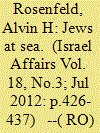

|
|
|
|
|
| Publication |
2012.
|
| Summary/Abstract |
The involvement of Jews in the much-publicized May 2010 Mavi Marmara incident at sea, is but one instance of many that illustrates Jewish collusion with Israel's detractors and defamers. While their numbers remain relatively small, the impact of such Jews in fostering a public rhetoric of anti-Israel vilification is growing and needs to be taken seriously. The current propaganda war against the Jewish state is, among other things, a language war, and close scrutiny of today's anti-Zionist discourse is essential.
|
|
|
|
|
|
|
|
|
|
|
|
|
|
|
|
|
|
|
|
|